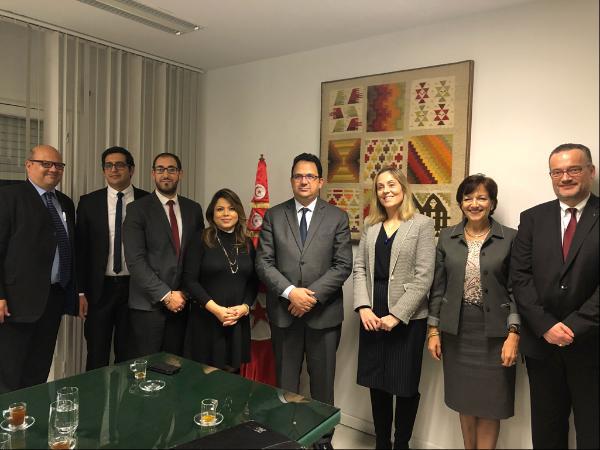
EUR 2.1bn of financing since 2011 to assist Tunisia’s transition and restore investors’ confidence
During her first official visit to Tunisia, Emma Navarro, Vice-President of the European Investment Bank (EIB), travelled to Sousse and participated in the “Business Days” event, in the presence of Head of Government Youssef Chahed.
The EIB Vice-President announced that the EIB had provided EUR 2.1bn in financing to Tunisia since 2011 to support inclusive and sustainable growth and restore the confidence of investors. In 2018 alone, new financing operations totalling EUR 205m were approved by the EIB’s Board of Directors.
“The EIB has mobilised substantial resources to support the new Tunisia with 7.7bn Tunisian dinars (TND) in new financing since 2011. We are looking to boost investments that contribute to sustainable development, social cohesion and employment in Tunisia”, stated EIB Vice-President Emma Navarro during her visit. She added: “With our Tunisian partners, we are supporting the rehabilitation of deprived areas and the regeneration of historic districts, particularly the medinas, to improve the daily lives of the people of Tunisia. We are stepping up our support for businesses, and we are promoting the development of sustainable projects, training and the creation of jobs, especially for young people. Tunisia’s future depends on this!"
For the successful rehabilitation of the most deprived areas and historic centres:
a new EUR 77 million investment
The EIB Vice-President took the opportunity of her visit to Tunisia to announce that the EIB had signed a EUR 77m finance contract for the large-scale Government-backed project to rehabilitate deprived areas and historic centres.
This new European investment will help to regenerate 146 low-income urban districts and several historic centres throughout Tunisia’s 24 governorates. The many medinas and historic districts constitute an invaluable part of the country’s cultural, architectural and intangible heritage. The EIB is proud to be helping Tunisian local authorities address the urgent need to provide these districts with basic public infrastructure, including water and sanitation networks, pavement and drainage of roads, the development of electricity networks and the construction of playgrounds and sports and socio-cultural complexes.
The EIB is also making all its expertise available for the management and implementation of this project under a technical assistance programme financed by the EU and jointly steered by AFD and the EIB.
This operation follows on from the success of the previous operation "Urban Rehabilitation Tunisia", which the EIB financed with EUR 70m in 2012, together with AFD, the EU and the Tunisian Government, to support the first national urban rehabilitation programme entitled "Programme for the Rehabilitation and Integration of Working-Class Residential Districts" (PRIQH 1)”, a national investment programme aimed at the regeneration of some of Tunisia's most deprived urban areas over the period 2012-2016.
Finally, this financing is consistent with the EIB's Economic Resilience Initiative, because of its expected positive social, economic and environmental impacts, in particular with regard to social cohesion and inclusion, job creation and stimulating economic growth.


